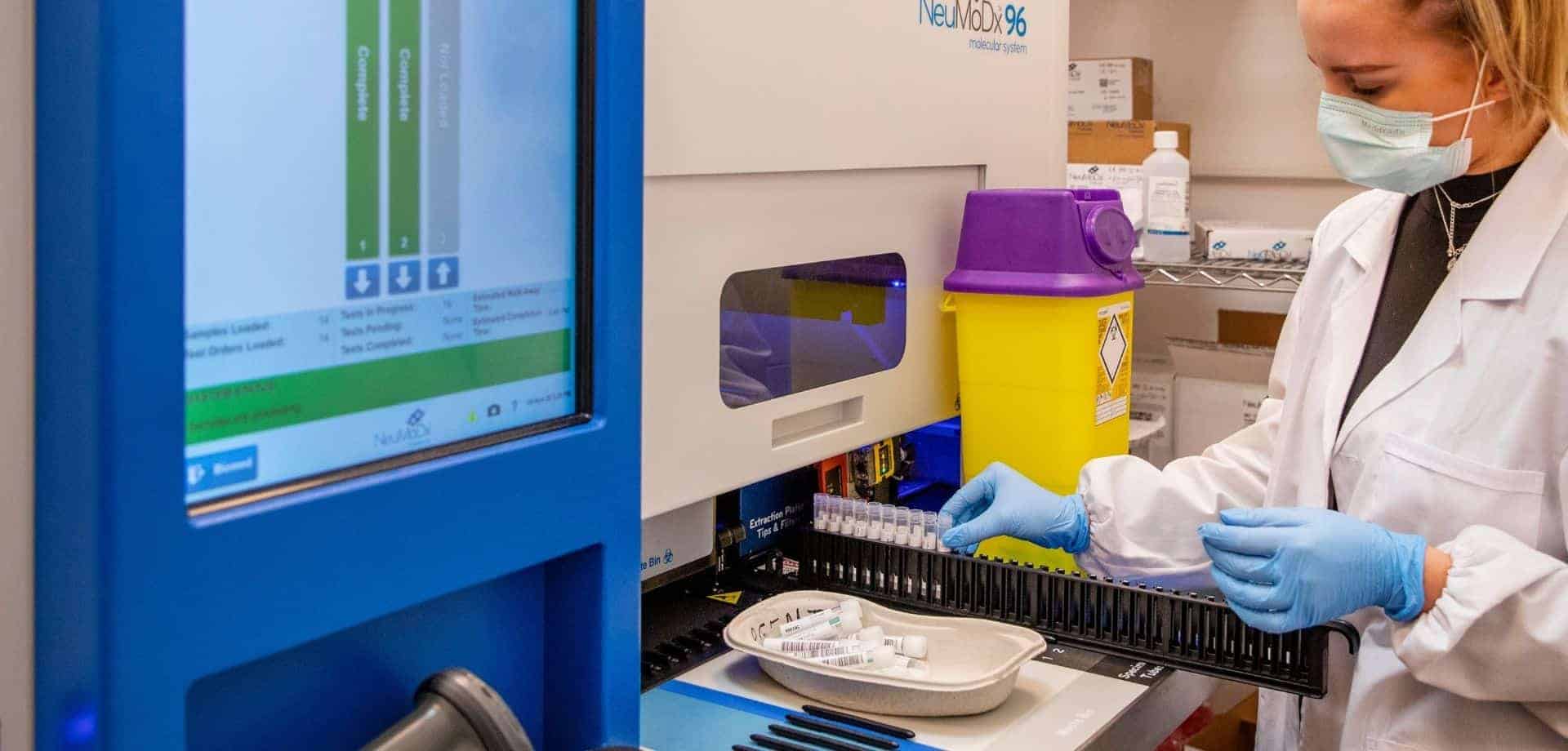Tag: Covid-19
I picked up Covid early in the pandemic and put my newly acquired immunity to good use by joining the Covid medical team at my local hospital for the weeks that followed. There was a side-effect however: a sense of invincibility that has perhaps made me take less care to protect myself from respiratory viruses ever since.
My luck ran out recently while looking after a group of patients with upper respiratory infections. Not all respiratory viruses are equal: we may call them “colds”, but some varieties are considerably more unpleasant than others.
Using PCR, we can now tell the difference between 22 different bugs with pinpoint accuracy, in about an hour. Mine turned out to be parainfluenza type 1 (there are four serotypes, who knew?) – a nasty virus, more common in the USA and among children.
My bout ranked alongside my experience with Covid: the symptoms lasted over three weeks and included a secondary lower respiratory infection requiring antibiotics to clear.
There’s no vaccine as yet against parainfluenza, but there are vaccines against other important respiratory infections – pneumococcal pneumonia, RSV, Covid-19, a newly-recommended adult top-up against whooping cough, and of course flu.
I shall be having all of these vaccines this winter and will take much greater care to protect myself when those around me have “colds”.
Hajj and Umrah are religious pilgrimages to Mecca, Saudi Arabia. Hajj is a mandatory Pilgrimage for every Muslim to take once in their lifetime, given that the individual is physically and financially able.
It takes place in the last month of the Islamic calendar and is taken annually by 2.5 million Muslims worldwide pre-pandemic. Whereas, Umrah is a shorter pilgrimage to Mecca taken any time of the year.
Muslims from all over the world gather annually in Mecca in a display of unity, faith and solidarity. Due to the large number of participants performing the pilgrimage there are some health risks you should be aware of.
There are also health requirements set by the Health Ministry of Saudi Arabia that you could affect your VISA. It is good to be aware of those requirements before travelling.
COVID-19 Requirements:
Ministry of Health KSA states that in order to perform Hajj pilgrims, one must have the proof for the following:
- A full course of COVID-19 vaccinations (second dose of a two dose vaccine or received a single dose vaccine) approved by the Saudi Ministry of Health. The approved vaccines’ list can be found here – Ministry of Health Approved Vaccines.
- There is no longer a requirement for PCR testing to perform Hajj or to enter KSA.
Vaccine Requirements:
A pre-travel consultation should be scheduled at least 4 weeks before your trip.
Any mandatory or advised vaccinations will be discussed with a nurse and can be given in the appointment. Follow up doses can also be arranged in the appointment.
Before travelling to Hajj or Umrah, it is recommended that pilgrims be up-to-date with all of their wellness vaccinations.
– Meningitis
All British citizens travellers performing Umrah or Hajj are required to submit a valid Meningitis ACWY vaccination certificate in order to obtain a visa. The MenACWY vaccine protects against meningitis (strains A, C, W & Y) and sepsis. Adults and children over the age of 2 are required to have the vaccine and provide evidence of immunisation no less than 10 days before you plan to arrive in Saudi Arabia. This requirement also applies to seasonal workers in Hajj areas.
You may also want to consider Meningitis B vaccine – this is not a mandatory VISA requirement.
If you require a vaccination, you can choose from our available appointments online – click to book your appointment.
– Covid-19
All travellers must be vaccinated against Covid-19 to perform Hajj Pilgrim. The vaccines that are approved by the Ministry of Health KSA can be found here – Ministry of Health Approved Vaccines.
– Polio
Travellers from countries reporting positive environmental sources samples of circulating vaccine derived polio virus 2 (cVDPV2), including the UK, are recommended to be vaccinated with at least one dose of IPV within the previous 12 months and at least four weeks prior to arrival, however there is no polio vaccination certificate requirement.
A polio certificate requirement will only apply to UK pilgrims if they are travelling to KSA via a country reporting WPV1, cVDPV1 or cases of cVDPV2 or Acute Flaccid Paralysis, and not if they are travelling directly to KSA from the UK.
If you require a vaccination, you can choose from our available appointments online – click to book your appointment.
– Flu Vaccine
Since both Hajj and Umrah both pose crowded conditions and close contact, seasonal flu vaccination is advised, especially for those who are more vulnerable to severe influenza diseases. This precautionary measure will help reduce the potential spread of the flu.
If you require a vaccination, you can choose from our available appointments online – click to book your appointment.
– Hepatitis B
Hep B is spread by contaminated blood and bodily fluid. Pilgrims who intend to shave their heads as one of the rites of Hajj should consider taking the vaccination. Although licensed barbers performing head shaving are obliged to use a new blade for each pilgrim, unlicensed barbers may not adhere to this practice. Vaccinations require 3 injections to be given over a 3 week period and can be given from birth.
If you require a vaccination, you can choose from our available appointments online – click to book your appointment.
– Rabies
Rabies is spread through the bite of an infected animal such as cats, dogs, monkeys and bats. Saudi Arabia is classified as a high-risk country for rabies. Full protection is achieved with 3 doses – 3 vaccinations usually given over a 3 week period, however, we do offer a rapid course which can achieve full protection in 7-days. The rabies vaccine can be given from birth.
If you require a vaccination, you can choose from our available appointments online – click to book your appointment.
TRAVELLERS’ DIARRHOEA
Travellers’ diarrhoea can occur in up to 60% of travellers. Although most cases are mild, taking sensible precautions with food and water can reduce the risk. Carrying medicines for self-treatments is useful such as antibiotics – take our Online Travellers’ Diarrhoea Consultation to see if it is suitable for us to prescribe you standby Travellers’ Diarrhoea treatment.
The best protection are preventative measures such as drinking bottled or purified water, washing your hands thoroughly and frequently and eating well-cooked, hot food.
Fore more information on Travellers’ Diarrhoea.
CLIMATE HEALTH
Saudi Arabia has had some of the hottest temperatures on record this year. Exposure to such high temperatures increases sweating, and results in loss of fluid and electrolytes which can cause rapid dehydration. This can result in heat exhaustion or heat stroke which can be life threatening if not dealt with promptly.
Heat related illness can be avoided by the following:
- Seek shelter and shade during the middle of the day (11am-3pm) when temperatures are the hottest
- If you are outside, ensure you protect your skin against the sun with high factor sun cream
- Wear loose fitting, lightweight and light colour clothing
- Keep hydrated by drinking plenty of fluids
- Ensure you are taking sufficient salt in your diet (sweating leads to electrolyte and salt depletion)
- Avoid caffeine and alcohol, which can worsen heat related illnesses
GENERAL HEALTH:
Both Hajj and Umrah pilgrimages require strenuous effort, it is worth considering having a full body medical check up before you travel to ensure you are in good health. To prepare for the miles of walking, try increasing your physical activities to improve mobility and movement. In case of unforeseen circumstances, remember to pack a first aid kit and extra supplies of any prescribed medication you are currently taking. We have an onsite pharmacy if you’d like to purchase any of these items during your appointment, speak with your GP or nurse whilst at the clinic.
DENGUE AND MALARIA:
Dengue is spread by day-biting mosquitoes and Malaria by mosquitoes that are active at night. You can reduce your risk of insect bites by using effective insect repellents and protective clothing. You can also sleep under a mosquito net that is impregnated with insecticide to have a peaceful sleep.
If you require complete protection from bugs and mosquitoes, you can check out our ultimate bug kit here.
Delaying your period:
If you decide you would like to delay your period for pilgrimage, you can do so by taking hormonal medication. In advance of your trip, book an appointment with a GP to discuss your options as soon as possible.
When you get home:
If you return home unwell it is important to book an appointment with a GP to determine the cause. If your symptoms worsen or becoming life-threatening do not wait to see a doctor, go straight to A&E for urgent medical care.
If you return with a stomach bug or persistent travellers’ diarrhoea, you may want to consider booking a Gastrointestinal (GI) Panel PCR test – it looks for any microbes (bacteria, viruses & parasites) that may be causing your symptoms and can quickly identify the exact cause. Results can be provided in as little as 1-hour, so that accurate and effective treatment can begin straight away. Firstly, you need to book a GP appointment, express your interest in a GI PCR test and they will advise whether you are suitable or not.
At Whitby & Co. and the Fleet Street Clinic, we strongly believe in our duty to protect our colleagues and patients alike, independently of Government regulations. We have stayed open since the start of the pandemic, delivering key health services for our patients, face-to-face and without interruption, but with no compromise on safety.
Despite the recent changes to isolation legislation and access to testing, you can rely on the fact that we plan to keep regularly testing all our staff for the foreseeable future – using highly sensitive rt-PCR tests in our own onsite lab. The benefits of rt-PCR testing means the infection is detected much earlier, rather than at peak infection which is when lateral flow tests only turn positive. We will advise our employees to continue to isolate in the event of a positive test: we prefer to pay our staff to stay at home, rather than risk spreading Covid-19 among colleagues or to our patients.
Whilst we absolutely recognise that the Omicron variant is less severe than previous dominant strains of SARS-CoV-2, we are not willing to compromise the health and wellbeing of our employees or patients when the severity is so unpredictable person to person. For peace of mind and to protect those most vulnerable, we will continue to wear face masks and prevent infectious individuals from entering our premises.
Our internal strategy appears thus far to be successful: although a number of us have inevitably had Covid-19 over the course of the pandemic, there have certainly been no outbreaks among staff from workplace transmission.
Beyond this, you can rely on the fact that all our staff are fully vaccinated, and indeed (like all health workers) were prioritised for vaccination from the earliest opportunity.
Whatever your reason for coming to see us at 29 Fleet Street – whether for an eye examination, a GP appointment, travel vaccines, or to use any of our other services, you can be confident that we have all been vaccinated and have had a recent negative coronavirus test. And this extends to if any of us come and see you at your home, office or place of work, you can be completely assured that we have used all our resources to protect you, your family and your colleagues.
Throughout the pandemic we have supported many industries trying to navigate business-as-usual alongside managing the potential risk of coronavirus in the workplace.
Identifying covid-positive individuals as well as outbreaks is essential, but it is also important not to underestimate the peace of mind testing brings to employees who may be anxious about catching covid-19 in the work environment, especially those who have been in close contact with someone at work who has subsequently tested positive.
The creative arts industry has been particularly impacted by closures, and given the close-contact nature of the theatre and performing arts sector, outbreaks do occur. The speed at which those infected can be identified can make all the difference between a show going ahead or being cancelled.
We have supported Kenny Wax Productions for the last 2 years with crisis management and routine testing using our ultra-rapid covid-19 rt-PCR testing service.
Here’s how we supported the production of MAGIC GOES WRONG during their Christmas crisis:
At 15:18 on New Year’s Day (a Saturday), we received a text to say that the entire cast of MAGIC GOES WRONG was heading straight to Fleet Street, following a positive result from one of their actresses. The only way the evening performance could go ahead was to determine whether covid-19 had spread throughout their cast, or not.
We understood the urgency of this situation and quickly and calmly took samples from a cast of 21 against the clock. We ran them through our lab at the same time, which can be quite a challenge. Since we knew that there would not be enough time to re-run samples, this needed to be done with special care. For us to be able to give Kenny the “thumbs up” to go ahead with the evening show, it was imperative we got things right the first time.
One of the best things about our NeuMoDx lab equipment is that we can load each sample as soon as it is taken, rather than waiting for the complete batch. We started running samples immediately, the last of them had finished running by 18:10, when we were able to assure Kenny that it was safe for the cast to go on with the show.
We were able to go from initial text enquiry to sample-taking and final, confirmed results for the entire cast in just over 3 hours.
Kenny Wax, the Producer of MAGIC GOES WRONG explains:
“Our West End hit MAGIC GOES WRONG had managed to avoid shutdown. However, an actress who had been feeling a little unwell leading up to New Year and continuously tested negative on lateral flows, finally came through with a positive test on Saturday morning 31st December. Hearing this news, the rest of the cast became very anxious about continuing performances until they were confident that covid had not spread throughout the company.
As Producer of the show, I was made aware of this information at 1.45pm. There was due to be a matinee at 2.30pm and an evening show at 7:30pm. We had no other option than to cancel the matinee but in an attempt to save the evening performance (a Saturday Night), at very short notice we attempted to get the whole company of 21 people PCR tested in the afternoon. To achieve almost the impossible everyone set off for the Fleet Street Clinic and by 6.10pm, we received the good news that the rest of the company had tested negative on the PCR and we were able to continue with the evening performance and the following two
shows on the Sunday. This not only saved us another financial blow due to cancellations at the box office, but we were able to provide entertainment to 1,500 customers across those three performances.Dr Dawood’s staff at the Fleet Street Clinic are always polite, friendly and efficient. They fully understood the nuances of working with a West End theatre production company on a very tight deadline. I am very grateful for their continuing support and cannot recommend them highly enough.”
For more information on our corporate coronavirus testing services and other covid-19 support services.
Following the confirmation of the new variant of coronavirus found in the UK, we have taken many enquiries regarding our PCR testing technology at Fleet Street Clinic and its ability to detect this new variant.
Please feel assured that our suite of Covid-19 rt-PCR detection equipment can confirm the presence of this new variant alongside the previously known strain.
We understand identifying this new variant of SARS-CoV-2 may cause concern due to its higher rate of infection compared to the previous known strain. However, rest assured, there is no evidence to suggest it causes more serious illness or would disrupt the effectiveness of the Covid-19 vaccine.
Prof Calum Semple, a member of the Scientific Advisory Group for Emergencies (Sage) which advises the UK government, said the new strain is likely to become the dominant global strain and it is therefore important our equipment is able to adapt to change to identify mutations to the SARS-CoV-2 virus.
At Fleet Street Clinic, we have developed a comprehensive portfolio of COVID-19 diagnostic testing solutions including multiplex rt-PCR detection and antibody testing and are able to provide rapid test results for diagnosis and travel purposes. This positioning hasn’t changed since this new strain has emerged. We pride ourselves on constantly adapting to meet the challenges of the Covid-19 pandemic and will continue to do so should any further genetic variations be identified on the SARS-CoV-2 genome.
For more information about our Covid-19 testing options, click here.
Covid-19 Statistics:
UK: Public Health England
Worldwide: The Johns Hopkins Center
Coronavirus Testing:
Covid-19 testing is available at Fleet Street Clinic, including PCR testing for active infection, antibody testing for confirmation of past infection and PCR testing for travel purposes including travel certificate.
Samples can be collected in-clinic, during a home from the nurse or using a self-sample home testing kit.
For more information:
Alternatively, please call our reception team on +44 20 7353 5678 to see which option is most appropriate for your current circumstance.
Virtual GP Appointments:
If you have symptoms of coronavirus (a high temperature or a new, continuous cough), please do not leave your home. That includes coming into the clinic, any other GP surgery, a pharmacy or a hospital.
We’d suggest you can book a virtual GP appointment with one of our doctors. You can discuss your health concerns and symptoms by telephone or video call.
Alternatively, you can use the NHS 111 online coronavirus service. If you are experiencing life-threatening symptoms, always call 999 for an ambulance.
If you have symptoms you should self-isolate for 7 days. If you live with someone who has symptoms, you’ll need to self-isolate for 14 days from the day their symptoms started. This is because it can take 14 days for symptoms to appear. More details about self-isolation can be found here.
For further information about coronavirus (COVID-19) or read answers to common questions about it.
How to stop the spread of Coronavirus:
- Wash your hands with soap and water often – do this for at least 20 seconds
- Use hand sanitiser gel if soap and water are not available
- Wash your hands as soon as you get back home
- Cover your mouth and nose with a tissue or your sleeve (not your hands) when you cough or sneeze
- Put used tissues in the bin immediately and wash your hands afterwards
- Do not touch your eyes, nose or mouth if your hands are not clean
Recommended information sources:
Gov.uk: For the latest guidance about coronavirus (COVID-19) for health professionals, businesses, schools and other organisations.
Public Health England: For the latest information about the situation in the UK, along with guidance for what to do if you think you’re at risk. You can sign up for email alerts from PHE concerning coronavirus updates here.
NaTHNaC: For travel health advice for travellers to countries/areas affected by COVID-19
World Health Organization (WHO)
__________________________
Our Medical Director and Travel Specialist Dr Richard Dawood, has been at the forefront of the conversation, sharing insight and opinions as the pandemic unfolds:
2021:
The Telegraph: Vaccine passports for travellers ‘unavoidable’
The Guardian: Vaccine passports ‘essential’ for resumption of international travel
The Sun: Covid vaccine questions answered – from when you can hug again to delaying 2nd dose
2020:
Times letters: Strategy for combating the coronavirus
The Telegraph: Staycations to face masks – 5 ways coronavirus could change the way we travel
The Telegraph: Why flying can make you ill – and how to stay healthy on board a plane
CNN Travel: Travel and the coronavirus pandemic: Everything you need to know
CNN Health: 7 of your latest coronavirus questions, answered
Express: Coronavirus: When will it end? Experts reveal if virus could die off in warmer weather
Express: Coronavirus protection: Best way to prevent the deadly virus spreading through the eyes
2019:
Mirror: Everything you need to know about flu jabs and why you should get one before Christmas
Please note: All information stated is correct at time of posting.









